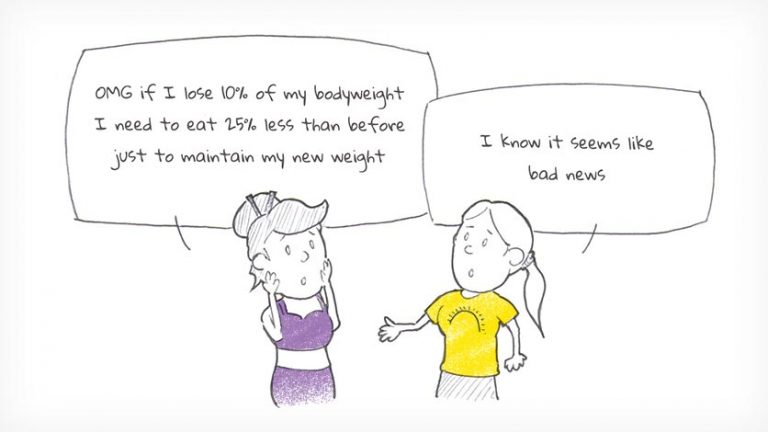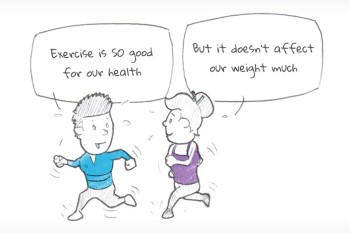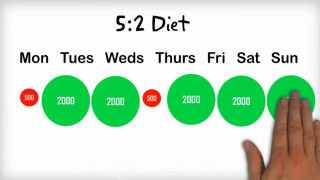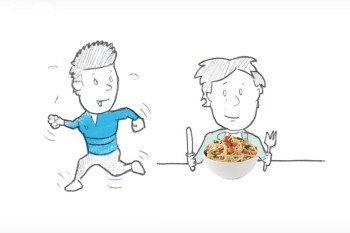Losing weight is hard, but keeping it off is even harder. If you are doing intermittent fasting in order to lose weight, it is probably not the first time you have tried to lose weight.
The sad truth is that very few people who lose weight manage to keep the weight off. Usually they blame their lack of willpower for not being able to stick to the diet or maintenance plan. If this sounds like you, stop blaming yourself right now: you don’t lack willpower (if you have already managed to stick to a diet for long enough to lose some weight, it proves you have willpower).
What you didn’t have on these other diets (but do now have with the combination of intermittent fasting and the support from FastDay) is the tools to overcome the incredibly powerful changes that occur in your body when you lose weight which work to encourage weight regain.
What happens with a ‘standard’ weight-loss diet?
If we are overweight, the benefits to our bodies from losing some weight are many: reduced risk of heart disease, diabetes, cancer, high blood pressure, back problems to name a few. Every year, millions of people attempt to lose weight, but if they follow a ‘standard diet’ their bodies will conspire against them:
Daily energy requirements reduce: it is a well accepted fact that your body needs less energy as you lose weight. However, this is not the fabled ‘starvation mode’ in which your body supposedly ‘holds onto fat’. The reduction in energy used by your body is made up of several changes:
-
Your lower weight means it takes less energy to move your body
-
Your smaller body needs less energy to keep warm and functioning
-
Your muscles become more efficient so that they need less energy1
-
You tend to move around less (this does not mean formal exercise, but how much you fidget, move around the house – what scientists call NEAT)1
-
Your metabolic rate (principally controlled by your thyroid gland) slows.1
If you lose 10% of your body weight, the amount of calories you need to eat to maintain your new weight might be up to 20–25% less than you needed at your old weight.1 Scientific studies of people who have successfully kept to a new lower body weight have found that this extra reduction in energy needs persists for years into the maintenance phase.1
What does this mean in practice? A 165cm, 40 year old, sedentary woman starting her diet weighing 100kg is predicted to be burning 2000 calories per day. If she managed to reduce her weight, by a fairly modest amount, to 90kg, the reduction in her energy requirements might be as much as 500 calories per day. No wonder she regains the lost weight!
The actual amount by which energy requirements are reduced following weight loss is a matter of some debate by scientists, but they all agree that there is some reduction. However, it is usual for people who ‘go on a diet’ to return to their previous eating habits once they reach target.
If you want to lose weight and keep it off you need to find a Way of Eating that is sustainable for many years. This is where intermittent fasting wins.
Learn more about balancing calories eaten with calories burned
Hunger levels and cravings for food increase: as well as reducing the daily energy required, your new smaller body encourages you to eat more.2 It does this in subtle ways that you may not notice unless you are paying attention.
-
The amount of the fullness hormone, leptin, is reduced in the body, while levels of the hunger hormone, ghrelin, are higher, resulting in increased hunger levels.3,4
-
Activity in the hypothalamus (the part of the brain that controls appetite) increases the desire and palatability of food, increasing hedonic hunger, particularly for high calorie foods.5
-
You tend to under-estimate the size of the portions you are eating.6,7
-
The increased hunger tends to persist even if you overeat.8
It is hardly surprising, then, that keeping to a lower body weight is extremely hard.
Learn more about how the body controls appetite
Intermittent fasting makes weight loss and weight maintenance easier
Scientific research into the metabolism in fasting has found that losing weight through fasting is different from standard diets:
-
Leptin levels may not fall so dramatically
-
Hunger is reduced
-
Hedonic hunger (cravings) are reduced
Of course your smaller body will still need fewer calories than it did when you were overweight, but using fasting will enable you to keep your calorie intake down to match your new needs.
Thousands of people in the FastDay community can confirm that intermittent fasting is a very different (and much easier) way of losing weight and then maintaining that loss. This is not to say that it is always easy: everyone has times when hunger or cravings seem to be particularly strong. That’s when a visit to the FastDay forum can help you to overcome these difficult moments.














